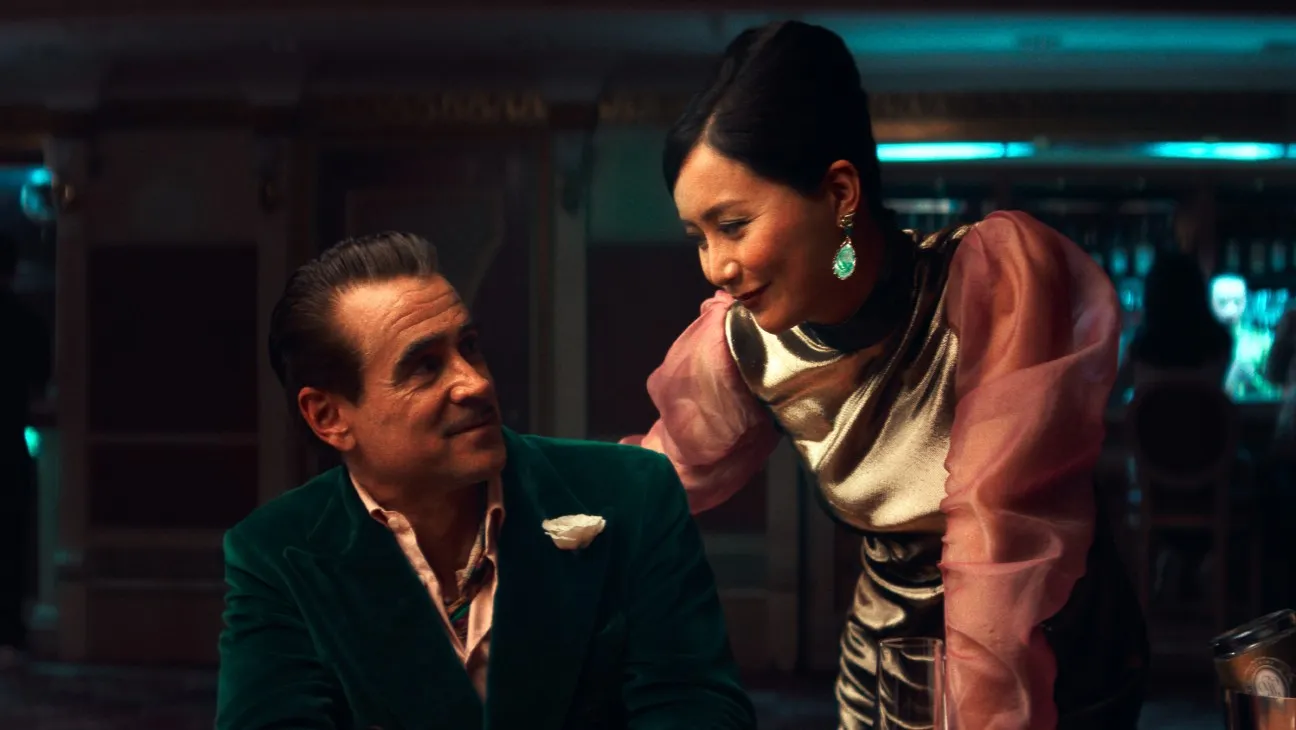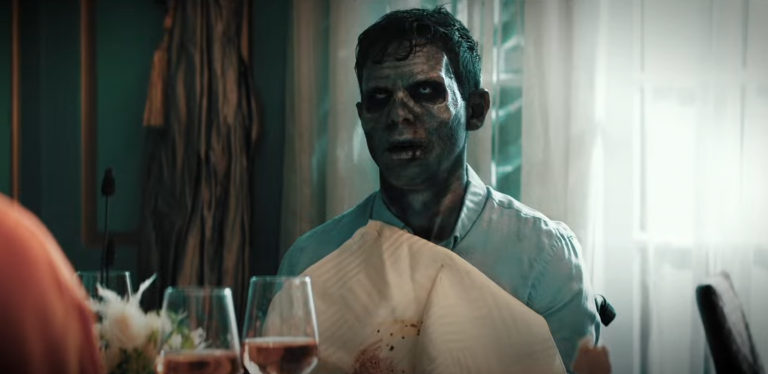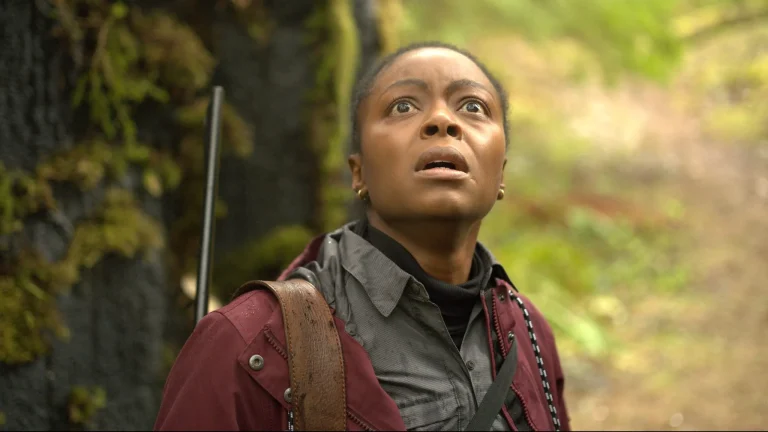Cinema, foremost, is a visual medium. And Edward Berger’s (“Conclave,” “All Quiet on the Western Front”) latest, “The Ballad of a Small Player,” is a glorious example of a boldly stylish cinematic voice superseding its ambivalent script. To quote modern Internet parlance, Berger and his cinematographer, James Friend, ‘cooked.’
Add Colin Farrell’s frenetic energy as the titular small-time gambler spiralling through the highs and lows of excess, and what we have here is, well and truly, the Bold and the Beautiful. Currently streaming on Netflix, the British thriller has Colin Farrell’s eccentrically named Lord Doyle fighting tooth and nail to keep his opulent life alive through the treacherous Casino alleys of Macau.
The Ballad of a Small Player (2025) Plot Summary & Movie Synopsis:
Based on the novel of the same name by Lawrence Osborne, the film’s story revolves around Lord Doyle (Farrell). Underneath the carefully constructed facade of the lordly demeanour, Doyle is bleeding dry, both financially and reputation-wise. He has a tremendous amount of debt, and his base hotel has given him a deadline to repay that amount. As a result, he looks for other casinos, where he can play on credit. In one such casino, after losing to the notorious Baccarat player, an old lady who simply goes by ‘Grandma,’ Doyle is approached by Dao Ming (Fala Chen).
Dao Ming is a loan shark, and she offers a good amount to Doyle at a moderate interest rate. Doyle initially rebuffs her, but soon feels the need for a loan as he loses in his next gambling adventure. Again. However, the next time he meets her, it is when a man jumps off a window, killing himself. As the man’s wife attacks Dao Ming, it becomes clear that the man was one of Dao Ming’s clients. Wracked with guilt, Dao Ming refuses to loan money to vulnerable gamblers. Not accepting no as an answer, Doyle follows her to her home.
Doyle says it is not her fault that the man decided to kill himself. According to Doyle, the deceased man chose a permanent comforting solution for a temporary problem. Doyle’s words comfort Ming. Doyle and Ming realize that they have more in common. The two share the same flamboyant veil while persisting with the same working-class childhood self. Their conversation takes them on a nightly stroll. After visiting a temple, they sit on a beachside jetty. Ming tells him that it is the first day of the Hungry Ghost Festival. The next morning, Doyle wakes to find himself sleeping on that jetty. However, Ming is nowhere to be seen. He finds a number written on his hand.
The Ballad of a Small Player (2025) Movie Ending Explained:
What Is the Real Identity of Lord Doyle?
Not being able to understand what the number means, Doyle goes back to his hotel to a new challenge in the form of Cynthia Blithe (Tilda Swinton). Blithe is a private investigator. Through Blithe, we learn that Doyle’s real name is Reilly. He defrauded a rich old lady in England and faked his death to assume escape. He came to Macau and assumed the identity of Lord Doyle. Cynthia gives Doyle an option to return the money he defrauded, or else she will inform the authorities. With the possibility of facing criminal charges in England, Doyle reaches out to his friend, Lippett (Alex Jennings).
But Lippett does not help him. On the contrary, Doyle finds that Lippett gave his real name away to Cynthia in the first place. Panicked, Doyle sees no other option. He goes to his hotel and stuffs his face with all the expensive food he can order. As the waiter asks him to pay for all those, Doyle senses his heart giving away. Just before he faints, he sees Dao Ming joining him at the table. He talks with her. Then he faints.
How Did Doyle Get the Money?

Also Read: The 45 Best Netflix Original Movies, Ranked
There is a lot of speculation about who Dao Ming really is. Let us go through what happens after Doyle’s heart attack, and then we can analyze Dao Ming’s existence. After the heart attack, Doyle wakes up in a shabby houseboat in Lamma Island, far from Macau. Dao Ming is there. She tells him that she has brought him here so that he can recuperate. Doyle spends a lackadaisically beautiful day with her. Ming tells him that it is not too late for him to embrace his real self. For a while, Doyle listens. However, when he wakes up to find Dao Ming gone the next morning, he feels the tug of the temptation.
Doyle finds a locked room. The room’s lock opened via the number that Dao Ming wrote on his hand on the first day of the festival at the jetty. Doyle finds Dao Ming’s entire savings. A huge amount to go back to Macau and play a lot of hands. And so he goes. This time, Doyle keeps on winning. Soon, he accumulates a wealth that is truly worthy of a ‘lord.’ He repays his hotel’s debts. However, the hotel manager bars him from playing in the future. They tell Doyle that the casino surveillance team has observed a ghost standing above Doyle’s shoulder during all the rounds he won.
Seemingly ridiculous as it is, that is enough to ban Doyle from all the casinos in Macau. A frustrated and spiralling Doyle starts to see visions. He gorges on all the hotel food and vomits heavily. He sees himself as a hungry ghost in the mirror. Once again, a faint voice from the other side provides a helping hand—Dao Ming’s voice. As if hit by an epiphany, Doyle decides to pay off his debts. He arranges to have one last round of Baccarat. The hotel manager allows as Doyle will bet all his money in one game.
What Happened to Dao Ming? Is She Real?
For Doyle’s ‘Winner-takes-all’ challenge, the opponent is none other than Lippett. In a tense round of clash, Doyle manages to trump over Lippett’s 7 count cards with his 9. Doyle pays all the money he owes to Cynthia. However, when he goes to meet Dao Ming, Grandma tells him that Dao Ming has been dead for a long time. She died on the first day of the festival. It appears Dao Ming drowned herself on the same morning Doyle woke up to find the number on his hand. It seems Dao Ming gave that to Doyle in the hope he would find that money.
Now the question is, has she been dead all along? She did mention she is a lost soul. Did she mean it literally? A lost soul, stuck in this world. Despite some theories doubting Dao Ming’s existence, there is a strong suggestion that she did exist. At least till the first day of the festival. Grandma’s conversation with her seemed quite real.
Did Doyle Imagine it All?
The ending of the film, as well as the original story written by Lawrence Osborne, leaves a lot for the viewers to interpret. There is no doubt that the story establishes Doyle as an unreliable narrator. And he has been struggling with hallucinations. However, there is a touch of the supernatural, too. Especially the way Doyle found the Lamma Island postcard. Yes, it does appear that after the heart attack, Doyle took himself to the houseboat. He recuperates by himself while imagining Dao Ming nursing him. Having said that, the imaginary conversation between Dao Ming and Doyle, where Dao Ming talks about Naraka (Buddhist Hell), seems to affect Doyle’s psyche later.
Is it possible that Doyle knew about Naraka beforehand? Sure. However, it feels that Dao Ming has been there with him, guiding his steps, hoping Doyle makes the right choice. Because it is also possible that Doyle died after having that heart attack, and he is in purgatory. He is winning all his rounds, but he is never satisfied. Happiness still eludes him. Isn’t that the hell we are all afraid of? “The Ballad of a Small Player” leaves the breadcrumbs for your imagination to take any path you want.
Is There a Mid-credit Scene?
In the end, Doyle burns all his money (the remaining amount after paying all the debts), after learning the truth about Dao Ming. It appears Doyle is no longer as lost as he was before. Dao Ming has been able to rescue him, even if it is for a bit. There is a mid-credit scene where Doyle dances with Cynthia. Doyle did promise to dance with Cynthia, along with the promise to pay the money back. Like he said throughout the film, a Lord keeps his promises. And it is fun to see Tilda Swinton and Colin Farrell shake a leg. It is quite unmissable.






![The Edge of Democracy Netflix [2019] Review – A Captivating and Sobering Account of Breakdown of Democracy](https://79468c92.delivery.rocketcdn.me/wp-content/uploads/2019/06/eod-cover-768x433.jpg)